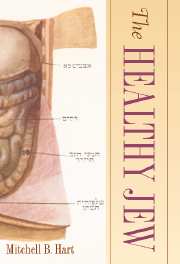Book contents
- Frontmatter
- Contents
- Preface and Acknowledgments
- THE HEALTHY JEW
- Introduction: “Links in a Long Chain”: Jews, Judaism, Health, and Hygiene
- 1 “'Tis a Little People, But It Has Done Great Things”: The Role of Health and Medicine in Modern Jewish Apologetics
- 2 Moses the Microbiologist: Alfred Nossig's The Social Hygiene of the Jews
- 3 Healthy Hebrews, Healthy Jews: The Bible as a Sanitary Code in Anglo-American Medical Literature
- 4 From Ghetto to Jungle: Darwinism, Eugenics, and the Reinterpretation of Jewish History
- 5 TB or Not TB, That Was a Jewish Question: Moses, Kashrut, and the Prevention of Tuberculosis
- 6 “Then What Advantage Does the Jew Have?”: Judaism as a Model for Christian Health
- 7 Conclusion
- Notes
- Bibliography
- Index
4 - From Ghetto to Jungle: Darwinism, Eugenics, and the Reinterpretation of Jewish History
Published online by Cambridge University Press: 18 July 2009
- Frontmatter
- Contents
- Preface and Acknowledgments
- THE HEALTHY JEW
- Introduction: “Links in a Long Chain”: Jews, Judaism, Health, and Hygiene
- 1 “'Tis a Little People, But It Has Done Great Things”: The Role of Health and Medicine in Modern Jewish Apologetics
- 2 Moses the Microbiologist: Alfred Nossig's The Social Hygiene of the Jews
- 3 Healthy Hebrews, Healthy Jews: The Bible as a Sanitary Code in Anglo-American Medical Literature
- 4 From Ghetto to Jungle: Darwinism, Eugenics, and the Reinterpretation of Jewish History
- 5 TB or Not TB, That Was a Jewish Question: Moses, Kashrut, and the Prevention of Tuberculosis
- 6 “Then What Advantage Does the Jew Have?”: Judaism as a Model for Christian Health
- 7 Conclusion
- Notes
- Bibliography
- Index
Summary
How to account for survival and preeminence in civilization? How to account for empires, and how to ensure their survival? Is every nation and empire akin to an individual, fated to be born, grow, and then inevitably decline and die? Or is the easy analogy a mistake; is intervention possible, decline and death avoidable? Such questions preoccupied nationalist, racialist, and eugenic thinkers at the turn of the twentieth century. At the other end of the spectrum, at the level of local communal existence, the questions were equally pressing: what sort of environment was most conducive to individual and communal health and survival? What effect did urban life have on individuals physically and mentally? And how did this translate into the health of the nation, the Volk, the ethnos or race? For many who considered such questions, the millennia-long survival of the Jews as a collective – a race, a Volk, a nation – along with their purported longevity and health as individuals, provided a key.
Structurally, the narrative on the Jews and survival mirrors in important ways the apologetic discourse on the contribution of Jews to medicine and civilization. Both reify the collective, and both depend on a notion of agency that credits “the Jewish people” with particular achievements – the translation of texts, transmission of knowledge, survival over millennia. The notion of agency, of course, does not really mesh with a strict Darwinian explanation of survival and transmutation based on natural selection.
- Type
- Chapter
- Information
- The Healthy JewThe Symbiosis of Judaism and Modern Medicine, pp. 105 - 142Publisher: Cambridge University PressPrint publication year: 2007



